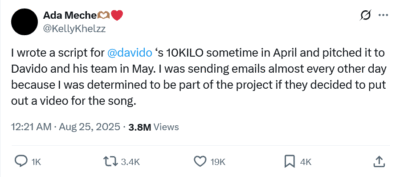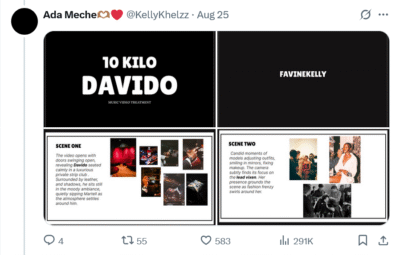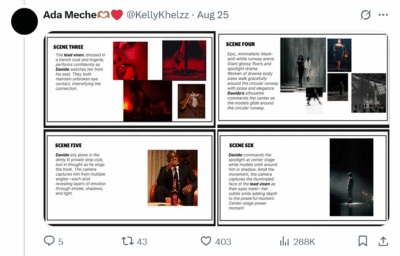🚨 Davido Accused of Idea Theft in “10 Kilo” Music Video Concept
In a detailed thread on Twitter (X), Kelechi alleged that she developed a script for the 10 Kilo video in April and repeatedly pitched it to Davido and his team ...

Lagos, Nigeria – Nigerian superstar Davido has been accused by writer and creative Adibuo Kelechi Divine-Favor of using significant parts of her video concept in the official music video for his hit song 10 Kilo, without acknowledgment or credit.
In a detailed thread on Twitter (X), Kelechi alleged that she developed a script for the 10 Kilo video in April and repeatedly pitched it to Davido and his team through unsolicited emails throughout May. According to her, the emails went unanswered, but she was shocked when the final video, directed by Director Pink, was released and appeared to reflect “a substantial part of her script: the very core theme and idea.”
She wrote:
“I wrote a script for @davido‘s 10 KILO sometime in April and pitched it to Davido and his team in May. I was sending emails almost every other day because I was determined to be part of the project… That’s why it broke me when the video directed by @directorpink_ dropped this month, and I saw a substantial part of my script right there in the video (though with a few tweaks).”

Kelechi also stated that her lawyers had since reached out to Davido’s team privately, seeking acknowledgment and possible compensation, but their communication had been ignored.
To back her claims, Kelechi posted parts of her script online, identifying similarities between her work and the video. Upon independent analysis scenes two, four, and six of her script resemble parts of the 10 Kilo music video.


However, further review indicates that while some thematic overlaps exist, scene one and three other scenes from her script does not appear at all in the video. The final production, described as a “beautiful storyline and an ode to plus-size beauty,” largely differs in execution and creative direction.
Peoples Chronicles consulted a copyright lawyer on the matter, she explained that Unsolicited Proposals typically do not form the basis for copyright infringement unless there is proof of receipt and substantial replication. She indicated that the absence of verified email addresses makes it uncertain whether Davido or his team ever received Kelechi’s messages. Furthermore, Even with similarities, the case is weak without concrete evidence of access or direct use. However, unsolicited emails can sometimes open the door for further engagement or acknowledgment, even if they don’t establish infringement.
The accusations quickly stirred debate on social media. Reactions were mixed, with many sympathizing with Kelechi’s frustration, while others argued that creative overlap is common.
@FlexxRichie wrote:
“That idea you think is unique… trust me, someone else probably has, maybe even many people.”
@Hybrid_Ola urged diplomacy:
“Did you even reach out to Davido to express your displeasure? Maybe the same concept was what the director already had in mind.”
@loveday_manuels cautioned about defamation:
“If evidence emerges that another producer sent their draft before yours, the case could turn against you, leading to character defamation claims.”
 At the time of this report, neither the recently married Davido nor Director Pink has responded to our requests for comment. However, the controversy underscores the recurring tension in the entertainment industry between unsolicited pitches and official productions. While Kelechi’s passion and persistence highlight the struggles of emerging creatives seeking recognition, the legal and factual gaps in her case make her claims difficult to substantiate.
At the time of this report, neither the recently married Davido nor Director Pink has responded to our requests for comment. However, the controversy underscores the recurring tension in the entertainment industry between unsolicited pitches and official productions. While Kelechi’s passion and persistence highlight the struggles of emerging creatives seeking recognition, the legal and factual gaps in her case make her claims difficult to substantiate.
Until Davido or his team issue a statement, the matter remains a debate of perception versus proof—raising important questions about how ideas are shared, protected, and credited in the Nigerian music industry.